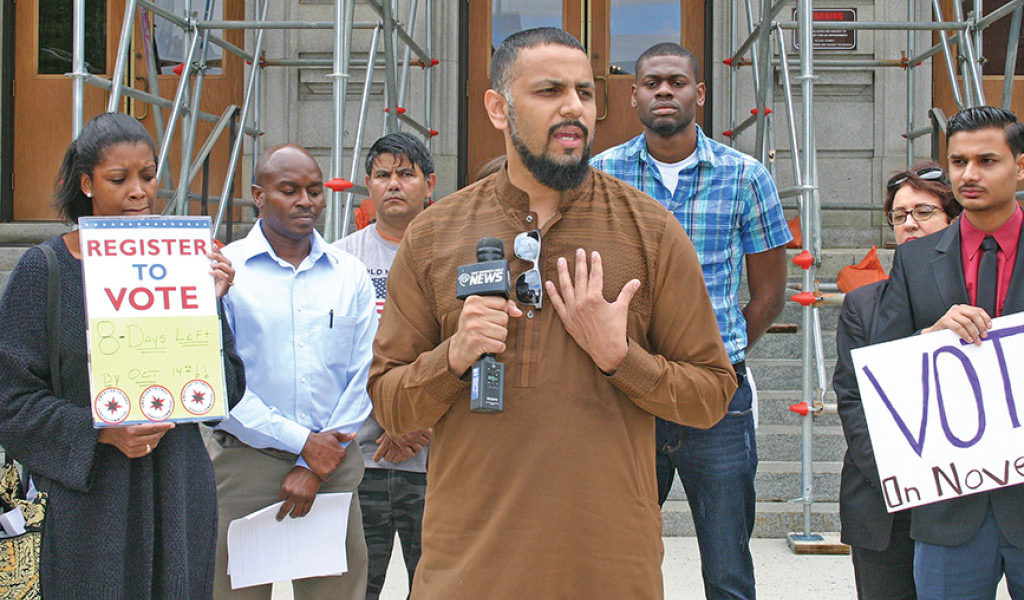
Photo courtesy The Carolina Peacemaker
What are common misconceptions you often hear about Muslim-Americans?
Muslims are anti-American. Muslims are anti-modernity. Muslims are terrorists. Muslims women are oppressed by their male counterparts. Muslims are in opposition to, or hate people of other religious faiths including Jews and Christians.
Has there been a time when you have felt bullied or harassed due to your faith? Could you tell us a bit about it?
I personally have not been bullied in my recent life based upon my faith. Although, I have heard many such complaints from people who are easily visually identified as Muslims. This group comprises mainly of women around the city of Greensboro as well as students that either visually or by action are as identified as Muslims.
How can non-Muslims best support their Muslim brothers and sisters?
Two ways: Educating Muslims on the rights they possess as US citizens and supporting programs that help bring basic information/recognition around Islam/Muslims (as understood by Muslims) to academic, work place and faith-based settings.
What’s the most effective way to address a bullying situation involving a Muslim-American victim?
First, report the incident and document it and provide trauma support to the victim and extended families. Second, Bring awareness to the problem. Lastly, build an anti-bullying network and hold anti-bullying programs via a regular cadence.
How can a classroom make safe space for young Muslim-Americans?
Bring awareness of bullying faced by Muslim-American youth, provide education around Islam and Muslims helping fight the misconceptions I mentioned above, and open dialogue between students to understand dynamics causing issues in the classroom.
What do you believe people across communities can do to end the harassment and violence towards people of the Muslim faith?
Three things: Inward facing education around Islam and Muslims, hopefully with Muslim involvement; participate in outward facing community events and programs with Muslim counterparts; and reach out to people that are not part of the “choir”.
If you could say one thing to someone who feels negatively about Muslim-Americans, what would it be?
Meet a Muslim locally and learn through the relationship, what Islam means to the person on the ground.
Do you feel there are particular differences to how American women of Muslim faith are perceived by society compares to the men of Muslim faith?
There is a stark difference, as Muslim women are viewed with an eye of judgement and cynicism, particularly those that wear a Hijab and are easily identified as Muslims. Harassment, marginalization and even emotional pity is given to the misconceived condition of the Muslim woman and the position is found hastily generalized.
How do you see rhetoric from politicians and public figures regarding Muslim faith affect treatment of Muslim-Americans? Do you feel it contributes to increased harassment of Muslim-Americans?
This harassment ebbs and flows over time and in earnest started after 9/11. There have been many incidents of increasing hate crimes around the US based upon recent election rhetoric. Specifically, the Islamic Center of Greensboro has received a few threats, including letters asking for Muslims to disappear from the Greensboro area. The response to this threat was the formalization of a yearly Peace Festival, started in 2015 and the inter-faith and community engagement event has been successfully organized for two years running.
Wasif Qureshi is President Emeritus for the Islamic Center of Greensboro and father of two beautiful children. He is hopeful and committed to the cause of peace, justice and equality with a focus on the immediate sphere of influence.
The views or experiences expressed are solely those of the contributor or interview subject and do not represent the views of the Tyler Clementi Foundation, its staff or board. If you have any questions or concerns regarding the material, please contact the Tyler Clementi Foundation, and we appreciate your support and commitment to end bullying starting on #Day1.

